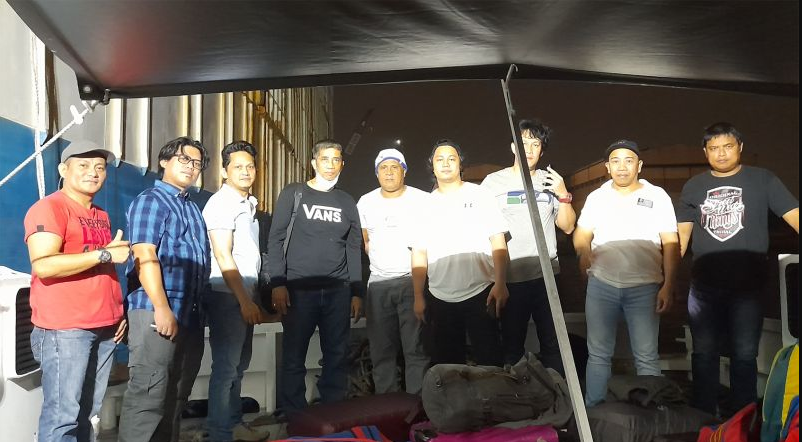
Thirteen Filipino seafarers have returned home after being stranded for over five months aboard an abandoned livestock carrier, the International Transport Workers’ Federation (ITF) announced Monday after working to secure their release.
The repatriation marks the end of a months-long saga involving one shady owner and two of its detained vessels in Singapore and Australia.
The Yangtze Harmony and its crew were abandoned in Singapore following the arrest of the vessel over an unpaid fuel bill in October 2022. The owner also stopped payments to the crew, who by April were owed $429,972 in total.
Upon inspection, the ITF found that the ship’s Hong Kong-based owner, Soar Harmony Shipping Ltd, had a history of abandoning crew and violating safety and crew welfare rules, discovering that the company had simultaneously abandoned another vessel, the Yangtze Fortune, along with its crew in Australia.
The Yangtze Fortune was abandoned after the Australian Federal Court seized a sister ship in Portland, Victoria, due to the owner’s refusal to make urgent repairs.
Despite similar circumstances, Fortune’s crew in Australia experienced a better outcome than the Harmony’s crew in Singapore, with over half returning home within weeks rather than months.
After ITF Australia, the Australian Maritime Safety Authority (AMSA), and the Marshall and Port State Control coordinated to release an abandoned mariner for a family funeral, the ITF successfully lobbied to reduce the Fortune’s minimum manning levels, resulting in the repatriation of 19 crew members back in January.
Between the two ships, the ITF’s advocacy efforts have now secured the release of all 43 seafarers from both vessels, while also recovering $1 million in backpay and flights home.
The ITF said the two cases highlighted the differences in the way Australia and Singapore handled abandoned seafarers, noting that the Australian system for repatriating abandoned crews was working well while Singapore’s legal system leaves crews in limbo.
The ITF said a key difference between the two cases was communication regarding labour and human rights. Unlike the Harmony’s crew in Singapore, Fortune’s crew had access to shore leave and medical care, and were visited by local welfare and union representatives. The Australian Federal Marshall also kept the crew informed about the ship’s progress toward its sale. In contrast, the Harmony’s crew faced months of uncertainty and confusion.
ITF Australia’s National Coordinator, Ian Bray, praised the common-sense approach to repatriation and crewing levels in Australia, noting that the process took over two months longer in Singapore. He also urged all port states to prioritise seafarer welfare and respond more quickly in such situations.
“We’re all very relieved to see the crew of the Yangtzee Harmony finally going home, better yet with half a million dollars of their owed wages in hand,” said Bray. “It’s good to see the 13 crew members of the Harmony joining the 36 of the Fortune who also went home recently. In both Singapore and Australia, the ITF has been effective in our interventions to see the two crews freed, paid what they’re owed for time on board, and repatriated home safely to their families.”
The Maritime Labour Convention (MLC), ratified by Singapore in 2011, specifies how crew abandonment cases should be handled. ITF Inspectorate Coordinator Steve Trowsdale argued that Singapore may have contravened the MLC by delaying proceedings for over five months. He also expressed hope that upcoming joint ILO-IMO guidelines, authored by the ITF and shipowners’ association ICS, would clarify how port states should prioritise crew welfare and handle abandonment cases.
The ITF also raised concern over actions from Harmony’s insurer. Under the MLC, if a shipowner fails to pay crew, the insurer should pay up to four months of the owed wages and cover the cost of crew repatriation. In this particular case, the Swedish P&I Club initially delayed payment to the Harmony’s crew, insisting on a court order. The ITF says they eventually paid the crew after correcting an initial account number error.
ITF’s Sandra Bernal, who led the advocacy for the Harmony’s crew, stressed that the contrasting responses of authorities in Singapore and Australia highlight how a port state’s approach can significantly impact affected crew members’ welfare and mental health.
“In Australia, efforts were made by authorities to inform crew of their rights, to check on their welfare, and to put their human needs above the commercial interests of the parties vying for a share of the ship’s sale value. There are elements of this kind of approach that I would like to see more widely adopted across port States,” said Bernal.
“We have to remember that abandoned seafarers are not criminals – they are the victims in this situation,” she added.
Copyright Ships & Ports Ltd. Permission to use quotations from this article is granted subject to appropriate credit given to www.shipsandports.com.ng as the source.
